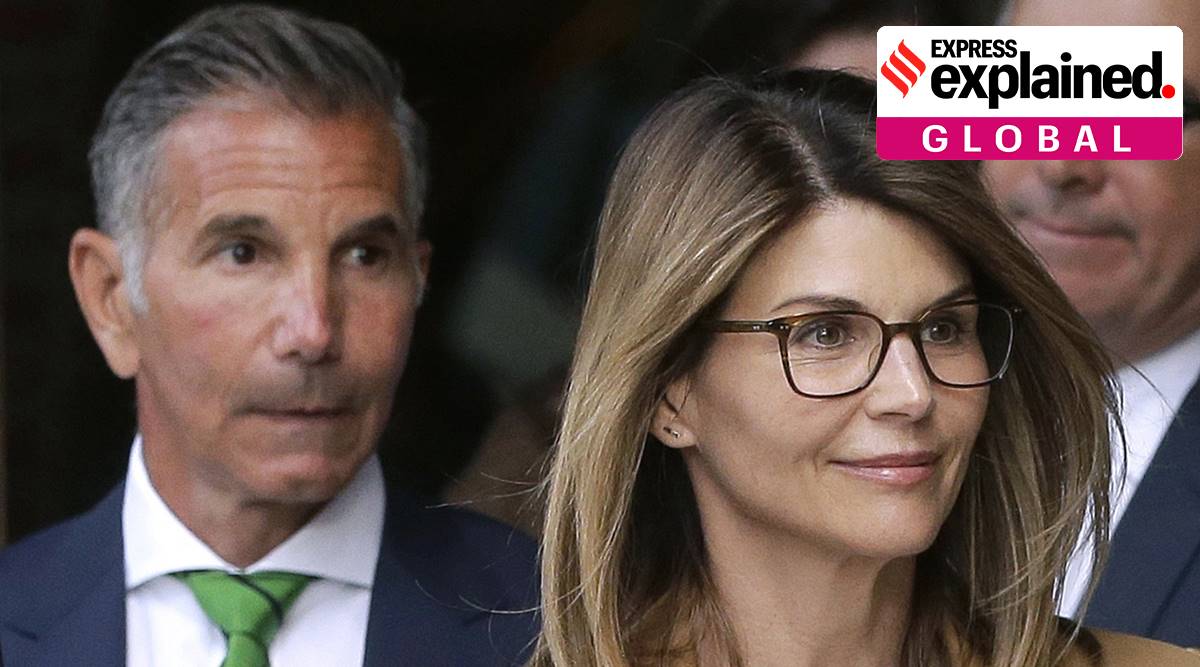Lori Loughlin sentenced in US college admissions scandal: What is it?
Since March 2019, 56 people have been charged for the scandal, investigation into which was code-named Operation Varsity Blues.
 Lori Loughlin and Mossimo Giannulli have been ordered to pay fines of $150,000 and $250,000 and complete 100 and 250 hours of community service respectively. (Photo: AP)
Lori Loughlin and Mossimo Giannulli have been ordered to pay fines of $150,000 and $250,000 and complete 100 and 250 hours of community service respectively. (Photo: AP)Since it was first reported in March last year, America’s college admissions scandal has seen many high-profile figures being convicted, including television personalities, business leaders and top lawyers.
The latest on the list is “Full House” actress Lori Loughlin, who on Friday (August 21) was sentenced to a prison term of two months for participating in the racket. Her husband, fashion designer Mossimo Giannulli, will be sent to jail for five months. Loughlin and Giannulli have also been ordered to pay respective fines of $150,000 and $250,000 and complete 100 and 250 hours of community service, Reuters reported.
In total, the bribery-for-admissions scam involved parents paying around $25 million from 2011 to early 2019 to the scheme’s organisers, whose reach extended to some of the most prestigious American universities, including Stanford, Yale, and Georgetown.
📣 Express Explained is now on Telegram. Click here to join our channel (@ieexplained) and stay updated with the latest
What is the US college admissions scandal?
The principal accused, William Singer, who ostensibly owned a college consultancy service, ran a racket that secured his clients admissions into elite schools, in exchange for hefty payments. The clients, who availed Singer’s services for their children, were aware of the criminal nature of the scheme – which Singer has since revealed had been availed by some 750 families.
In March 2019, the US Justice Department categorised the racket into three parts: arranging a third party to take the SAT and ACT standardised tests in place of actual students, falsely designating applicants as potential recruits for college athletic teams, and money laundering using charitable accounts.
In the first part, Singer would use compromised invigilators to guarantee the required test scores for his clients, who took the competitive exams at centres he controlled. This would at times involve the students faking a learning disability to get extended time for completing the test – spanning consecutive days, during which the invigilators would guide them to the correct answers. This ‘service’ cost anywhere between US $15,000-$75,000.
The second part, which has caused the greatest outrage, is the bribing of coaches in charge of non-mainstream sports such as volleyball, soccer, water polo, and tennis at top universities. Singer would influence these coaches into granting admissions on seats reserved for elite sportspersons. Singer would also create fake CVs of his clients, showcasing them as accomplished sportspersons, all with the knowledge of these varsity coaches.
Finally, the Justice Department charged the alleged culprits with money laundering, using a fake charity to siphon the funds collected from parents.
Operation Varsity Blues
Since March 2019, US prosecutors have charged 56 people with crimes linked to the scandal, the investigation into which was code-named Operation Varsity Blues. Of these, more than 40 people have pleaded guilty or agreed to plead guilty, the list including key conspirator William Singer, parents, college coaches and administrators.
As per a CNN report, 20 have so far been sentenced. In September last year, “Desperate Housewives” actor Felicity Huffman was sent to prison for two weeks and fined $30,000. The harshest sentence came in February this year, when Douglas Hodge, the retired CEO of a top investment firm, was awarded 9 months in prison and a $750,000 fine.
Also in Explained | Who is Donald Harris, the economist father of Kamala Harris?
Changes at US colleges
After the scandal broke, its nature and extent gave rise to a wave of public anger, with aggrieved parents demanding a transparent college admissions process. Since then, some universities and colleges have adopted new procedures.
The University of Southern California now requires every head coach to give in writing that prospective students are admitted based on athletic ability, and a college department has to verify that the student eventually joins a team after enrolling.
At the University of Virginia, students tapped for sporting teams are now asked to sign a pledge that they would actually join those teams, according to a New York Times report.
- 01
- 02
- 03
- 04
- 05






































